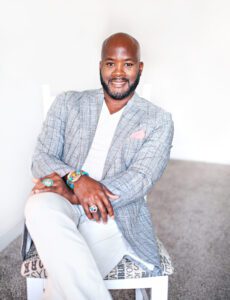 Demetrye Isoldi is a survivor of heart-wrenching childhood trauma and abuse. His home life was steeped in neglect, violence, and abuse. His mother was a whore. His father – a serial rapist. And his brother – a serial killer.
Demetrye Isoldi is a survivor of heart-wrenching childhood trauma and abuse. His home life was steeped in neglect, violence, and abuse. His mother was a whore. His father – a serial rapist. And his brother – a serial killer.
Demetrye had chosen a different path for himself. He had refused to be a victim. Instead of following his parents’ path of abuse, violence, and destitution, Demetrye chose to use his brokenness as fuel for the rest of his life by forging his own path to success, freedom, happiness, and love.
Together with his wife Elena Isoldi Medici, they have built a successful life and health coaching practice that has touched thousands of lives around the world.
Son of a Whore – their breakout book – part autobiography, part confessional, and a part spiritual renewal is their homage to the resilience of the human spirit and fortitude in the face of extreme hardships and trauma.
KIMBERLY MASKA: Welcome everybody to Spiritual Biz Chat for Spiritual Biz Magazine, and today we are joined by Demetrye Isoldi, the author of the groundbreaking book with a brave title “Son of a Whore”, that was just released a few days ago. Welcome, Demetrye, thank you for being with us, and congratulations on such a big accomplishment! How are you doing today?
DEMETRYE ISOLDI: I am doing fantastic! And it is such a pleasure to be here with you today.
KIMBERLY: It’s a pleasure to have you here, Demetrye! Your life journey is absolutely incredible! To learn more about you and what you do, it is very important for our readers to first learn about your childhood, full of unimaginable pain, trauma, violence, and abuse. Could you, please, share a bit?
DEMETRYE: Absolutely! And thank you so much for asking.
For many years, I thought that my trauma was nothing special. Since I had grown up with it, I normalized it. It took me meeting my wife, Elena Isoldi Medici – who is the co-author of our book “Son of a Whore”— for me to realize just how abnormal it is to be abused and traumatized.
I was born into a family of a slave offspring. For generations, my ancestors suffered from trauma and abuse – being torn away from their homeland, getting shipped to a land they did not know, only to be stripped of their humanity. By the time I came into this world, the violence my ancestors suffered got ingrained into my family’s fabric.
My mother tried to abort me. On her own! No doctor would perform an abortion at the stage of pregnancy when she decided she did not want to keep me. She grabbed a wire hanger and tried to dig me out of her womb. Thankfully, I survived.
My father was not much kinder. I remember an instance when I was left with him, and something made me cry. I was not even two. He did not know how to make me stop crying, so, he grabbed a pillow and nearly suffocated me to death by pushing it over my face.
His violence also extended to my sister, whom he molested when she was barely three.
My parents never tied the knot. After a few years together, my mother decided to kidnap us and relocate from Georgia to New Jersey to find a better life. However, our lives did not get better, they got much worse.
We did not have a place to live for a long time. So, for many months, our mother would shift us from one place to another just to spend a night. My sister and I were often left with strangers sometimes for hours and sometimes for days, while she spent her time chasing after love and acceptance with as many men as she could manage to fit into her schedule.
Often, we would go hungry and untaken care of. But even that was not the worst of it.
My mother had a violent temper, so, at any provocation, she would use switches, extension cords, wire hangers, Wiffle Ball bats, wooden sticks, hair spray bottles, and anything she could get her hands on to beat us into submission. She called it discipline.
The damage she inflicted on us, however, went more than skin deep. She would regularly bring men to our dilapidated one-bedroom apartment, which was infested with rats and roaches, to copulate with them in front of us. Thus the title of my book. She also allowed many of these men to discipline us in the same way she did.
After about four years of bouncing between homes and experiencing extreme trauma, my mother decided to give us to be raised by another family.
For a while, we felt like we were better off. However, it did not take long before we began to experience the same kind of violence from our new family. We had experienced physical, emotional, and sexual abuse at their hands.
My body was often covered in bruises so severe, that I would have to skip school to avoid questioning.
I was also subjected to humiliation that scarred me for years. Getting naked beating was demoralizing.
They kicked out my sister for going to a prom when she was still in high school. She was homeless at seventeen. I left them at the age of nineteen when I left for college.
The pain and the trauma that was inflicted on me left a very deep imprint. It was tough to trust people. And even harder to let someone love me. I simply did not know what love without pain felt like, so, I pushed away anything good that came into my life.
In my book, “Son of a Whore,” I describe the long road that I traveled between being a victim to becoming a villain – when I inflicted emotional pain on the person who loved me unconditionally. This was a curse and a blessing because only once I hit the rock bottom, did I start looking for my way out.
And this is exactly what we describe in the book – our ability to find a blessing even in the worst of situations.
With the help of my wife, I was able to take my worst pain and turn it into triumph. It was not easy, and it did not happen overnight, but I finally found my way to freedom and created the life I did not even know I could dream about when I was a child.
KIMBERLY: How did you manage to survive it all and choose happiness over victimhood? And how does it all come to fit on your path to your current life’s purpose and work?
DEMETRYE: Since my life was steeped in violence, I did not know there was a difference between living and being. However, since childhood, I always yearned for love and acceptance. So, I looked for it anywhere I could find it, even if it was with my abusers. To be fair, the abuse was not non-stop. There were days without violence and I felt normal, just like any other kid.
There were also very special spiritual moments when I felt that I was being watched and protected by a force that was not human. When I was little, I did not know what to call it. However, I often felt that I was not alone, when my mother would abandon us, and that someone kept an eye on me. It gave me solace.
There was a turning moment in my life when my mother passed away. Our adopted family took us to Disney World to cope with her passing. I was only eleven. I remember being there and experiencing the opulence and grandeur of that place. One night, when everyone was asleep, I stayed up dreaming about how wonderful it would be for me to grow up and have a life filled with things and moments that seemed outside my reach. This, in a way, became my mental reset point. After that trip, I began to search for ways to become something bigger and better than my environment was creating me to be.
As I grew, I always sought for a deeper meaning to why my life gave me exactly what I had. It is the proverbial turning lemon into lemonade process. Not always fun, but the outcome is super delicious. However, it was not a straight-line process.
The time when I felt that I became a villain was my wake-up moment. This is when I had to decide on the kind of man I wanted to become. The person that I inflicted the most pain on was my wife. You will read more about this in the book, but when she decided to stay with me, I had watched how the trauma that I brought with me into adulthood affected not only me but her as well.
She decided to stay with me, and we worked on healing from trauma together. Hers and mine. And it was her forgiveness and acceptance of me just as I was that allowed me to see that I did not have to live in my trauma; that I could heal beyond it and use it as a launchpad to creating the life I want for myself and for the ones who love me.
I now have the kind of life that I can be proud of – a wonderful wife, an amazing daughter, and even a rambunctious cavapoo pup. Together, we have traveled around the states and overseas – something that I did not even know could be possible when I was young. My biggest fear back then was ending up homeless.
After all that my wife and I had gone through, we are now passionate to show others that when they decide to live beyond forgiveness – a concept that we take a deep dive into in the book – instead of coping with the pain and the trauma they endured, they can too embrace it as a part of their journey and make something beautiful and meaningful out of it.
KIMBERLY: I’m sure you get asked this a lot, but how can someone even begin to forgive their abusers who cause so much pain? How can someone forgive, forget, and move on? How important is it to do so? And should someone even forget or use those memories, even the worst ones, to their benefit somehow?
DEMETRYE: This is the one-million-dollar question and something that I struggled with for years.
I was brought up in an ultra-religious family. It’s hard to believe, isn’t it? But the trauma they inflicted on me was justified by “spare the rod, spoil the child.” So, since a very young age, I was told that we must forgive those who have done us wrong.
However, I found that forgiveness in itself did not complete the work that I wanted it too. I still had flashbacks to the times I was abused. The trauma still lived in me and contorted my soul, so I mimicked my abusers, albeit in a different way, and inflicted pain on others. So, I found that forgiveness, at least the way we are taught to forgive, does not accomplish what we hope it would. At best, it makes the abusers feel like they get off the hook. Yet, the ones who get abused are often left with the kind of pain and baggage I just described.
It was my wife who had a huge revelation of needing to go beyond forgiveness in order to heal from the trauma, and not only heal but to use it to our advantage. She calls it “there is nothing to forgive” philosophy. We take a deep dive into it in the book.
To give you a synopsis of it, here is what we believe – it is not our responsibility to forgive the abusers. It is our choice. And that only when we have gone through the full spectrum of emotions – pain, fear, anger, resentment, and whatever acute emotions we might feel when we have been abused, can we be ready to move beyond the pain. When the pain has been fully experienced and expressed, then we move into the next phase – assimilation and evaluation of what it means.
I would caution people from trying to forget the pain – it simply isn’t possible. Blocking it out will not lead to healing. Instead, it can set up us for future suffering, at the most unexpected moments.
Instead of forgetting it, we need to synthesize it. And to synthesize means to process, evaluate, and assimilate. Which leads us to the next step…
If and when we are ready to forgive someone’s wrongdoings against us – we can do that. But we do it for our benefit, not for theirs. They must find their own way to making their wrongs right with us, others, and the divine in them.
Eventually, and this is something we passionately share with anyone willing to listen, we can move into the most enlightened step of healing from trauma, and only when we are ready for it – realizing that everything that happened to us…happened for us.
It’s not an easy step to take, I can guarantee it. And it must come from a place of emotional maturity and readiness. But when we are ready to take the step, then it’s possible to see even our abusers as necessary puzzles of our lives to get us to where we can choose to go – a life of peace, tranquility, self-acceptance, and an uninterrupted connection to the divine in us.
KIMBERLY: Congratulations again to you and Elena on your newly released book! What a brave title, “Son of a Whore”!What do you wish to accomplish by putting your life’s story on its pages? What is the most important thing you hope for the readers to take away after reading your book?
DEMETRYE: Thank you so much! We are absolutely thrilled!
It took years for us to finish this project, and now that it is launched into the world, Our biggest hope for everyone who reads “Son of a Whore” is to find the courage and willingness to heal. To shed the victim mentality. To grow in the understanding that life happens for us, not to us.
It is our biggest hope that our readers find their path to living beyond forgiveness, but also find a way to forgive themselves. Many abuse victims often take on the pain they lived through and blame themselves for what had happened to them.
Ultimately, we would love to see each person spend time working on themselves. Find their own truth. Discover who they are outside of pain, or as a byproduct of it. We believe that only when we take ownership of everything that happens in our lives, can we heal, and not only as individuals, but as families, communities, countries, and ultimately, as a global collective.
No more victimhood! No more blaming others. No more barely surviving.
We believe that it is the most important message we can share, especially in the current political and spiritual climate.
KIMBERLY: What is your ultimate goal with your work? What is your mission? Your dream? What are some projects that are on your mind and that you are currently working on?
DEMETRYE: Our dreams are big, and often they seem daunting. But we know they are possible. We want to empower a billion women and men to take their rightful place in their lives. To become whole, so they can heal others. And eventually, our dream is to see humanity evolve to the next phase of human evolution, where there is no pain, poverty, or suffering.
Our biggest goal, at the moment, is to get “Son of a Whore” into as many hands as possible. We want to engage as many wholeness seekers as possible for them to find their joy, and then spread healing and love to others.
Our wildest dream after that would be to see the book produced into a movie, so even more lives can be healed.
KIMBERLY: Is there a final message you want to let our readers know? Or any last words you have for them?

DEMETRYE: Thank you for giving me the opportunity to share my message. And yes! Here is what I would love for them to know – we are no one’s victims! No matter the pain and the suffering we might have survived, it is up to us to release ourselves from the prison of someone else’s choices. It is up to us to choose what emotions we live in, and what we will do with our pain.
We are survivors. Yes! But ultimately, if we choose this path that we talked about, to live beyond forgiveness, we become victors and creators of our destiny and our happiness.
And each of us, regardless of whether rich or poor, big or small, educated or not…
Regardless of our gender, our color, and our ethnicity – we have that power in us, to rise above trauma and create wholeness for and in ourselves.
KIMBERLY: So inspiring, Demetrye, thank you very much! It has been such a pleasure chatting with you today!
DEMETRYE: Thank you for having me! It’s been a pure pleasure.


